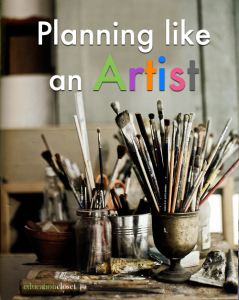Artist Habits of Mind – A Great Planning Tool for 2014
 Guest Blog by Rob Levit, Executive Director, Creating Communities, Nonprofit Member of Maryland Nonprofits
Guest Blog by Rob Levit, Executive Director, Creating Communities, Nonprofit Member of Maryland Nonprofits
Want to learn more about how to implement the arts into your nonprofit’s mission? Join Rob October 16th for a special event.
And, learn to think better with Rob’s Connecting Impact workshop at our upcoming Annual Conference “Connecting for Impact”!
Read the original blog here.
Harvard Project Zero’s 8 Artist Habits of Mind (aka Studio Thinking) provides a great framework for planning your personal growth as an educator in 2014. If you haven’t had the opportunity to reboot, retool and renew your plan for 2014, there is still time to be intentional and take steps toward a productive and fulfilling year. Here are some sample questions for each category to jump start your reflection. Grab a journal and write!
Develop Craft
In your educational practice, what is your strongest area? Is it instruction, preparation, student engagement, technology, or arts integration? How can you leverage this successful area of your craft and make it more effective? What’s next for you in developing your craft and how are you going to get there? What does the “next level” look like and how will you turn your craft into an art?
Engage and Persist
What projects have you been delaying? Why? Is it an arts integration class? Networking for new opportunities? Make a list of what you’d like to accomplish in 2014 – personally and professionally. What opportunity would provide the greatest reward – financially or in terms of professional satisfaction – if you engaged and persisted in its accomplishment?
Envision
Look ahead to the end of 2014. On December 31, at a wonderful New Year’s Eve party, you find yourself looking back on the past year as a fantastic one. Why was it fantastic? What did you accomplish? What do you want your work/life balance to look like? This looking ahead can become your vision for a masterpiece of a year. Write down that vision and keep it close, review it. It’s OK if it doesn’t all happen in the way you think it should but at the very minimum you have something grand, noble, inspirational, and exciting to drive you.
Express
What will be your healthy outlets for self-expression in 2014? Hanging out with friends and family? Yoga? Walking? A new painting or creative writing class? Singing in the community or church choir? Being an educator is stressful work. Be sure to build in some time to express yourself as it’s crucial to your mental and emotional health.
Observe
How do you feel at the end of your best day? Write down your observations. How do you feel at the end of a bad day? Write down your observations. Compare and contrast your self-study. What’s the difference maker between a great day and a bad one? Learn by observation your patterns for success and failure. Build structures of support around what makes you feel good – a brisk morning walk, five minute meditations, healthy meals and snacks, feeling prepared for the day, etc. – and keep track of them. Gain personal power over your life by being an objective observer of your habits and patterns and making positive use of those observations.
Reflect
Of all the habits, I believe reflection is the most key. Without some solitude and silence to really listen to our deepest needs and desires for our life and career, we run the risk of being on autopilot with one day bleeding into the next as we gasp for air on the weekend, holidays, and summer vacation. Reflection – whether through meditation, personal time, being in nature, etc. – is crucial to renewal. It’s a time where we don’t have to think analytically but can just be and feel things in a deeper way and attune to the larger patterns of life. I often take my reflection time on Saturday morning before my family is awake or on Sunday evening as a way of calming down and becoming present for the week ahead. What is your reflective practice?
Stretch and Explore
As an educator, choose a content area to stretch and explore. We all know the limitations and constraints of the curriculum and yet there are some wonderful opportunities to become more of an expert in a particular area. I love poetry and haiku and have lots of arts integration activities in those areas. I am a collector of poems, art, and music based on poetry and simple techniques for creating meaningful works of creative writing. If you had unlimited time to spend on a particular topic, which one would you choose? Great! Now that you have chosen it, read up on it and start stretching and exploring what’s possible!
![]() Join Maryland Nonprofits’ 2014 Annual Conference “Connecting for Impact!” November 5th at the Universities of Shady Grove in Rockville, MD.
Join Maryland Nonprofits’ 2014 Annual Conference “Connecting for Impact!” November 5th at the Universities of Shady Grove in Rockville, MD.
Connect with Maryland Nonprofits on Facebook, Twitter, LinkedIn, and Google+, tell us what you think and what kind of topics you would like to see more of on our blog.
![]() Fall into a rewarding nonprofit career, follow @MDNonprofitJobs
Fall into a rewarding nonprofit career, follow @MDNonprofitJobs
